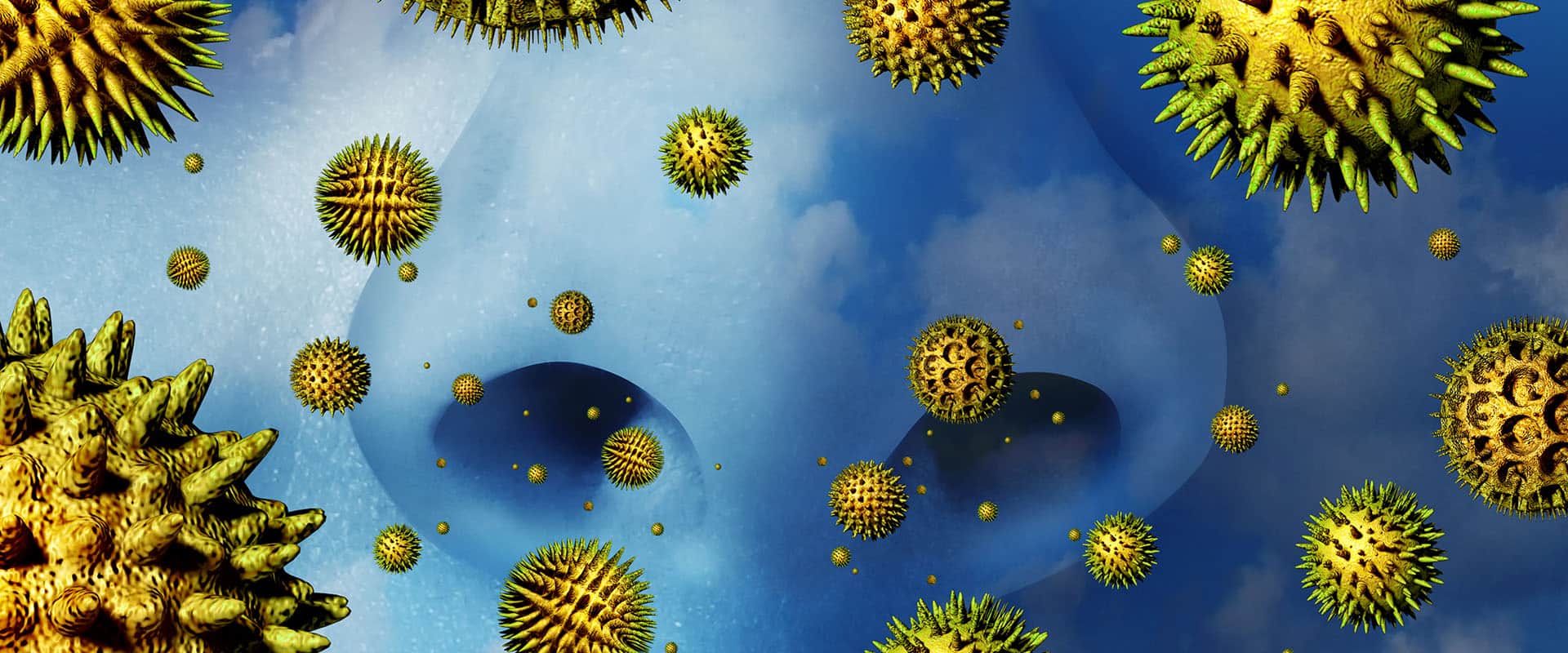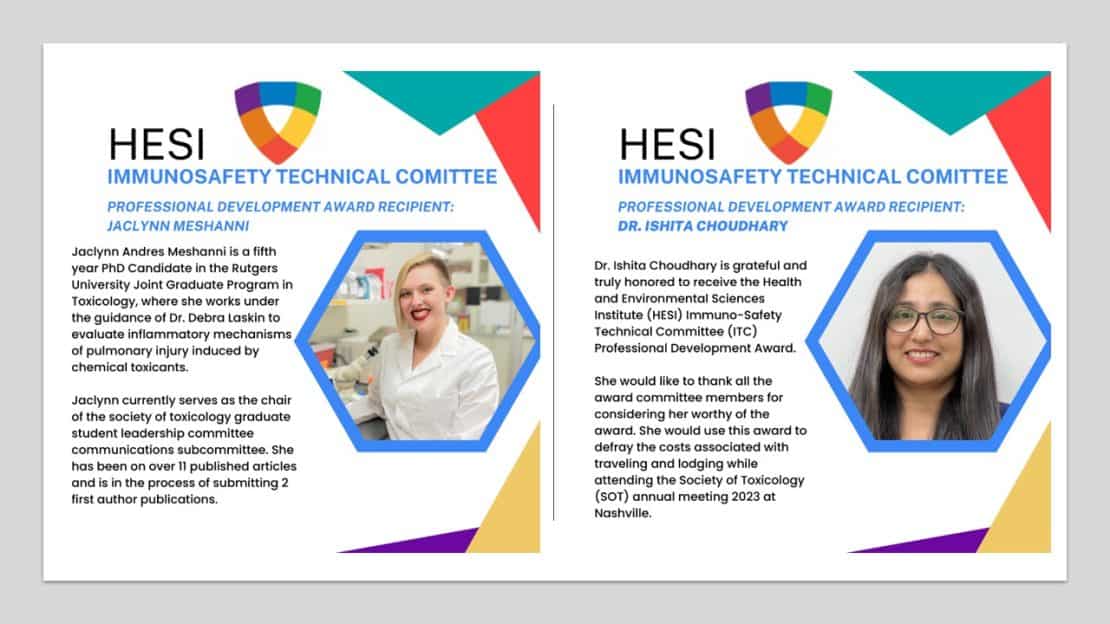This workshop was sponsored by the HESI Immunotoxicology Technical Committee (ITC).
Workshop on “Monitoring T Cell Responses in Non-Human Primates for Drug Development”
October 25, 2011
Washington, DC, USA

The mission of the HESI Immuno-Safety Technical Committee (ITC) is to identify and address scientific issues related to immune safety and translation to human health risk assessment.
Key Objectives:

The HESI ITC seeks graduate students working in immunology, toxicology, pathology, or related field for a second cycle of their new HESI ITC Mentorship Program. This program will allow meaningful interactions between trainees and mentors to give insight on various career pathways and discuss how to streamline the mentees’ long-term goals. The second cohort will tentatively be from May – June 2023 with 4-5 one-on-one mentor meetings. As well as an opportunity to network with past mentees and expert immuno-safety committee members at our ITC annual meeting (25-26 April 2023).
If you have any questions about the HESI ITC or this program, please contact Dr. Shermaine Mitchell-Ryan

1. Ishita Choudhary, Louisiana State University
Research area: Investigating the mechanisms of ozone and allergen induce lung injury.
2. Jaclynn Meshanni, Rutgers University
Research area: The role of Lipid homeostasis in macrophages and its impact on the development of Pulmonary fibrosis resulting from Nitrogen mustard exposure.
Regulatory Gaps
This group aims to provide a review of regulatory guidance documents with an educational lean to serve as a primary reference for state-of-the-art assays, models, regulatory guidance, and references.
Immunomodulation and Pregnancy Risk Assessment
This work aims to evaluate and incorporate learnings on preclinical immune safety assessment of pregnancy risk in the presence of immunomodulatory therapy. The 2020 FDA/CBER-HESI Immunomodulators and Pregnancy Risk Workshop convened key stakeholders to discuss both current and novel methodologies in preclinical and translational safety assessment of pregnancy risk associated with immunomodulatory therapy. Through the sharing of case examples, followed by longer in-depth discussion within each session, the goal was to begin to address gaps in biology, current tools, and other aspects of pregnancy risk that need to be considered during drug development. The 2020 HESI Symposium on Assessing Pregnancy Risk of Immunomodulators provided a broad overview of the role of the maternal immune system in the establishment, maintenance, and completion of a healthy pregnancy. The sessions covered both current and novel methodologies in preclinical and translational safety assessment of pregnancy risk associated with immunomodulatory therapy as well as address gaps in biology, current tools, and other aspects of pregnancy risk for consideration during drug development. An overview of marketed therapeutics highlighted current knowledge of the effects of immunomodulators on pregnancy in nonclinical animal models, potential class effects, and available data from patients exposed during pregnancy.
Nanomedicine (Nanopharmacology)
A position paper on the immunotoxicity assessment of nanomedicines is being developed.
NK/CTL Assays
Under the method development working group, this project team is developing a manuscript that provides the tools and assays available to assess either cytotoxic T lymphocyte (CTL) or natural killer (NK) cell function.
Examining the Use of Humanized Mice as a Preclinical Model in Drug Development
This project is designed to identify gaps/issues highlighted from a committee-wide survey regarding the use of the model and to design specific projects to resolve important issues identified.
Cytokine-Release Assay-In Vivo Cytokine Release
This project is evaluating what parameters contribute to the variability in cyno control animals.
FIH Dose Selection for Immunomodulators
This work aims to determine a suitable course of action for establishing a first-in-human (FIH) dose for various types of immunomodulators.
Drug Hypersensitivity Reactions
This work will develop a compendium on how to assess and test for drug hypersensitivity reactions in both preclinical and clinical settings.
Immunotoxicology Training Course
The ITC convenes an annual training course on immune safety science. The training course will transition to a virtual modular format to broaden the committee’s reach and add flexibility to course offerings.
Science Outreach
These efforts aim to develop resources and activities for outreach at select scientific meetings and to create a platform to advocate and educate the next generation of immuno-safety scientists.
ITC Website Development
An ITC-centric website where both scientists and the public can find information on the field of immuno-safety has been developed. Visit the website here: https://immunosafetyresource.org/
ITC Clearinghouse Database
This work aims to create a clearinghouse/database that contains resource information related to the field of immune safety and to share information internally and externally to drive education and outreach. Visit the database here: https://immunosafetyresource.org/itc-databases/



Université Paris-Saclay

Amgen, Inc.

GlaxoSmithKline
October 25, 2011
Washington, DC, USA
This workshop was sponsored by the HESI Immunotoxicology Technical Committee (ITC).
Journal of Immunotoxicology, 2012
The development and regulatory approval of immunomodulatory pharmaceuticals to treat many human diseases has increased significantly over the last two decades.
Human & Experimental Toxicology, 2012
A workshop entitled 'Developmental Immunotoxicology and Risk Assessment' was held on 12-13 June 2001, in Washington, DC.
Toxicologic Pathology, 2012
Developmental immunotoxicity (DIT) testing is centered around the concern that exposure to immunotoxicants early in development may result in enhanced susceptibility of, or unique or more persistent effects on, the immune system, in comparison to adult exposure.
Journal of Immunotoxicology, 2012
Epstein-Barr virus (EBV)-associated lymphomas are a known risk for immunosuppressed individuals.
Journal of Immunotoxicology, 2012
While immunotoxicology evaluations are often conducted in either rodents or non-human primates, findings in standard toxicology studies may trigger additional investigations in dogs.
Journal of Immunotoxicology, 2011
The Immunotoxicology Technical Committee of HESI sponsored a retrospective analysis of T-cell-dependent antibody responses in non-human primates (NHP).
hesi@hesiglobal.org
Phone: +1-202-659-8404
Fax: +1-202-659-3859
740 15th Street NW, Suite 600
Washington, DC 20005
Sign up for our monthly e-newsletter.